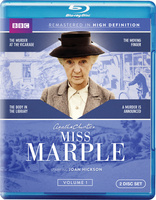Miss Marple: Volume 1 Blu-ray Movie
HomeMiss Marple: Volume 1 Blu-ray Movie 
The Murder at the Vicarage / The Body in the Library / The Moving Finger / A Murder is AnnouncedBBC | 1984-1986 | 527 min | Not rated | Oct 28, 2014
Movie rating
8.1 | / 10 |
Blu-ray rating
| Users | 0.0 | |
| Reviewer | 4.0 | |
| Overall | 4.0 |
Overview
Miss Marple: Volume 1 (1984-1986)
Gather your wits and join best-selling author Agatha Christie’s popular sleuth Miss Jane Marple in four delightfully baffling mysteries starring Joan Hickson, the actress Christie herself wanted for the title role.
Starring: Joan Hickson, David Horovitch, Ian BrimbleDirector: Martyn Friend, Christopher Petit, Mary McMurray, David Tucker
| Period | Uncertain |
| Crime | Uncertain |
| Drama | Uncertain |
Specifications
Video
Video codec: MPEG-4 AVC
Video resolution: 1080p
Aspect ratio: 1.33:1
Original aspect ratio: 1.33:1
Audio
English: DTS-HD Master Audio Mono
48kHz, 16-bit
Subtitles
English SDH
Discs
50GB Blu-ray Disc
Two-disc set (2 BDs)
Playback
Region A, B (C untested)
Review
Rating summary
| Movie | 4.0 | |
| Video | 4.0 | |
| Audio | 4.0 | |
| Extras | 2.0 | |
| Overall | 4.0 |
Miss Marple: Volume 1 Blu-ray Movie Review
Reviewed by Jeffrey Kauffman October 29, 2014Rarely has one actor been so thoroughly associated with a role as David Suchet has been with Agatha Christie’s inimitable Poirot, despite legendary performers like Albert Finney (who was Oscar nominated in Murder on the Orient Express) and Peter Ustinov also tackling the part. Christie’s other iconic detective, mild mannered spinster Jane Marple, has had a somewhat more varied screen life, though if one were to associate an actress with the role, chances are it would be Joan Hickson, who played Miss Marple for around eight years from 1984 to 1992. While Gracie Fields had essayed the role for television in the fifties, it was the ebullient Margaret Rutherford who was first strongly associated with Marple in a series of big screen comedy-mysteries which were quite popular in the early sixties. (In fact MGM attempted to launch a Poirot series in the wake of the Marple successes, but their only effort, The Alphabet Murders, tanked, perhaps due to the somewhat odd casting of Tony Randall in the role.) Rutherford’s Marple wasn’t exactly Christie’s character, but she was memorable and amusing. Over twenty years later Hickson (who had a small role in the Rutherford Marple Murder, She Said) stepped into the role, to the approval of Christie herself, who had evidently once told Hickson that when Hickson was a bit older, she hoped the actress would play the part. The Hickson Marples may seem quaint to younger viewers who have become used to the latest reboots featuring actresses like Geraldine McEwan or Julia McKenzie, versions which have in some instances radically changed Christie’s plotlines in a risky gambit, done perhaps to keep longtime fans guessing, that has nonetheless angered purists who feel Christie can’t be bettered. While actresses as notable as Angela Lansbury and Helen Hayes have also stepped into the Marple role, Hickson’s characterization will probably forever be held up as the paradigm. She may not have had the duration of Suchet in Poirot, but her impact can’t be minimized.

The four episodes in this first volume of Miss Marple are:
Murder at the Vicarage. While this wasn’t the first Miss Marple to air (that was The Body in the Library), this was the first appearance of Miss Marple in a full length novel, way back in 1930. Miss Marple is introduced almost discursively here, in the wake of a dust up at the local vicarage, where a local doyenne’s one pound offering has gone missing, leading to umbrage and an impending investigation by the church’s lay treasurer, the imperious Colonel Protheroe (Robert Lang). In typical Christie fashion, St. Mary Mead is awash in intrigue and hidden relationships, with the Colonel’s put upon second wife Ann (Polly Adams) hiding a nascent affair with visiting artist Lawrence Redding (James Hazeldine). The local vicar, Leonard Clement (Paul Eddington), becomes aware of the subterfuge, but is distracted first by his klutzy younger wife Griselda (Cheryl Campbell) and then by the mysterious murder of the Colonel right in the vicar’s own study. There are of course a number of seemingly suspicious supporting characters lurking around on the sidelines, but when various folks actually start confessing to the murder, Miss Marple works her quiet magic even as the frustrated Detective Inspector Slack (David Horovich) tries to pretend he’s solving the case. (It's a bit odd that BBC places this episode first in this set, since Miss Marple clearly states she first dealt with Slack in The Body in the Library case.)
This version of Christie’s tale hews very closely to her novel, unlike the more recent television version starring McEwan. Interestingly, there’s some religious subtext here that plays into the long distrust between Anglicans and Catholics (listen to how the Colonel disparages the curate as a “papist”), an element which has tended to be featured more overtly in the most recent Poirot offerings, where Poirot’s Catholicism has played at least tangentially into some episodes. Hickson’s take on Miss Marple is spry, but perhaps less of a meddling busybody than might be expected. Marple just seems to always be in the right place at the right time, rather than intentionally poking her nose into everyone else’s business. Still, she’s shown to not be above the idle gossip mill, as detailed in a snarky scene where she has tea with a bunch of other elderly St. Mary Mead women at the vicar’s home one day.
The Body in the Library. As mentioned above, this was actually the first Miss Marple to air, broadcast over the Christmas holiday in 1984 (murder and Christmas seem to appeal to the Brits). This was also the first adaptation to air in the revised Marple series which initially starred Geraldine McEwan as the venerable sleuth. That version radically altered Christie’s original and provided a scenery chewing turn by Joanna Lumley as Dolly Bantry, a friend of Marple’s who is alarmed to discover, yes, a body in her library. In this 1984 iteration, Dolly is played by the significantly more reserved Gwen Watford, and the story does not delve into salacious events like hidden lesbianism the way the newer version does (the Marple reboots sometimes seem to suggest that a lot of fifties’ Britain was inexorably gay). Part of the fun of this episode is the fact that while there is indeed a body in the library, nobody initially seems to know exactly whose body it is.
Perhaps because this episode helped to launch Miss Marple, there’s a bit more of a drawn out feeling to it (it originally aired over three nights in the United Kingdom, and it’s presented here in that original three part version). There’s also a more comic tone to many of the proceedings here, including those of the flamboyant film director Basil Blake (Anthony Smee) and his tempestuous girlfriend Dinah Lee (Debbie Arnold). In fact a sense of wry amusement runs through quite a bit of this episode, with some nice little moments like when Dolly attempts to describe her husband’s addled state of mind to local constable Colonel Melchett (Frederick Jaeger), doing so with a string of non sequiturs that seem to drive the military man to distraction but which Miss Marple apprehends with just a slight tilt of her aged head. That’s future Mrs. Sting, Trudie Styler, playing Josie Turner, a character who may hold the key to the entire mystery.
The Moving Finger. Part of the subtext of the Miss Marple mysteries in particular was the cognitive disconnect between the apparently bucolic paradise of St. Mary Mead and other picturesque English villages and the often rather hideous behaviors of the residents. That proclivity is delivered (literally, as in dropped off at the door) via a series of so-called “poison pen” letters that start showing up after a young brother and sister named Gerry (Andrew Bricknell) and Joanna Burton (Sabina Franklyn) lease a rather luxe manor house while Gerry is recovering from an injury. These two are on the receiving end of one of these nasty missives, but they at least decide it’s all just a bad joke. When another resident evidently commits suicide after having received one of the deliveries, things seem to be taking a much more dour turn, and when a second body soon turns up, it’s not long before Miss Marple is on the case.
The Moving Finger is an interesting example of typically brilliant Christie misdirection combined with the author’s unerring eye toward human behavior, including some seemingly inherent differences between the sexes. When, for example, a nascent form of police profiling seems to point to a meddlesome older biddy (just like Miss Jane Marple, in fact) as the culprit, Miss Marple herself of course has other ideas. As with virtually every Christie mystery, there are red herrings galore, with a number of characters harboring certain secrets, and yet the motive for both the letters and the deaths turns out to be almost frighteningly banal.
A Murder is Announced. This is one of Christie’s most elegantly plotted Miss Marple outings, one that casts its net rather wide both geographically and generationally, revealing a decades’ long ruse whose unfraying proves to be the kiss of death for several characters. Once again this BBC version takes its time, spooling out over three episodes, letting the beautifully realized vignettes between various people unfold at a languid but never boring pace. Interestingly, this was the first ever small screen Marple, the aforementioned Gracie Fields entry from 1956. Her co-star was the inimitable Jessica Tandy, playing an elderly woman named Letitia Blacklock, played here by Ursula Howells. Letitia is confounded one morning to see a small classified ad in the local newspaper announcing a murder at her house for the coming weekend. That announcement soon sets off a chain of events that does in fact see someone getting killed—though the victim seems to be the one perpetrating the advertised “murder”.
Letitia and her housemate “Bunny” (Renee Asherson) initially feel that the whole escapade is some kind of joke, but one that a number of residents take seriously enough to show up for, as if a party of sorts is about to unfold. When an interloper does appear, all hell breaks loose, including the loss of electricity, something that plays into the ultimate resolution of the case. Once again a rather tangential (and probably too convenient) relationship draws Miss Marple into the case, but not soon enough to prevent there being more victims. The smallest details like some moved furniture and a seemingly innocent slip of the tongue play into this fantastic piece of writing, one that remains at or near the top of Christie’s entire output. That’s future Inspector Lewis Kevin Whately playing another somewhat Lewis-esque second fiddle during the investigation here.
Miss Marple: Volume 1 Blu-ray Movie, Video Quality 
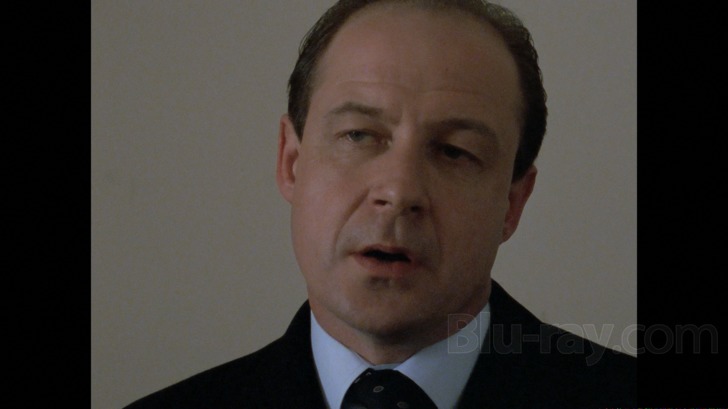
Miss Marple Volume 1 is presented on Blu-ray courtesy of BBC with an AVC encoded 1080p transfer in 1.33:1. Younger viewers may be unimpressed with this presentation, but for those of us who are old enough to have seen these episodes broadcast and in various previous home video incarnations, the results approach the revelatory. What was once a kind of drab, often yellow-tinged, presentation that frequently bordered on the fuzzy and inchoate has been beautifully upgraded with these new high definition masters. Sourced from the original A/B roll camera negatives, there is a rather large uptick in detail and clarity, but perhaps the biggest difference here is with regard to color timing. What used to be an almost saffron ambience is completely gone, replaced with a much more natural looking palette that supports everything from the admittedly sallow flesh tones of some of these Brits to more vivid hues courtesy of the foliage in various English villages. There has been some noise reduction here along with the usual removal of dirt and scratches, though to my eye it's been applied judiciously. While grain can be minimal in things like brightly lit skies, it's more than apparent in ruddier textures like thatched roofs or even tweedy costumes. There are still occasional variances in sharpness. Watch, for example, when Colonel Protheroe first leaves the church in Murder at the Vicarage, and a small but noticeable downgrade in clarity is quite evident, but considering the various elements that were utilized and the herculean task of restoring these older 16mm outings, the results are largely stupendous and should delight longtime Miss Marple fans.
Miss Marple: Volume 1 Blu-ray Movie, Audio Quality 
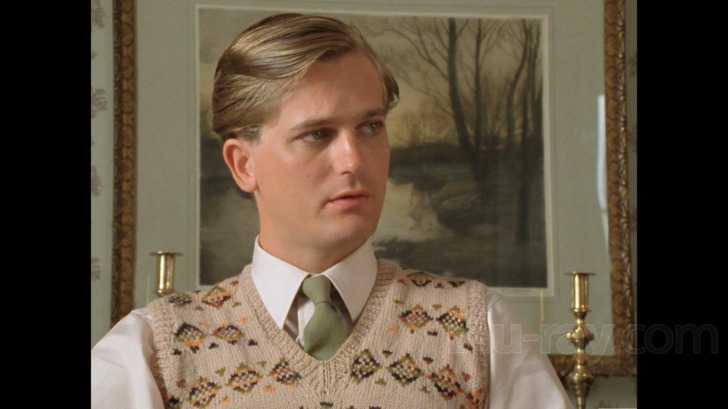
Miss Marple Volume 1 features a lossless DTS-HD Master Audio Mono mix that does perfectly well with the various episodes' rather talky ambiences, but perhaps just a bit less well with regard to some of the music, including the charming opening theme by Ken Howard. Even here, though, there is a manifest uptick in clarity, especially with regard to the brass, from the old DVDs of this series. There are no major issues on any of the episodes other than a typically somewhat boxy sound that stems (no pun intended) from the source.
Miss Marple: Volume 1 Blu-ray Movie, Special Features and Extras 
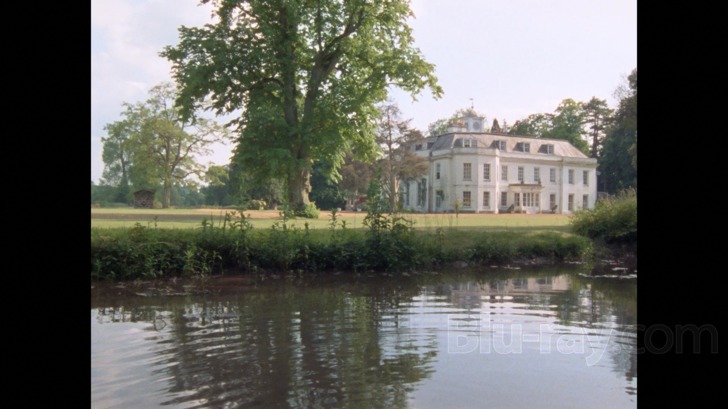
- A Very British Murder - Part One: The New Taste for Blood (1080i; 50:04) features Lucy Worsley in a very well done examination of murder and its ineluctable interest by the general public. Worsley starts with an actual murder from a couple of centuries ago, but then starts to examine how tales of murder started to ripple out into the general public consciousness, ultimately becoming literature in the hands of writers like Dickens, Doyle, and of course Christie.
Miss Marple: Volume 1 Blu-ray Movie, Overall Score and Recommendation 
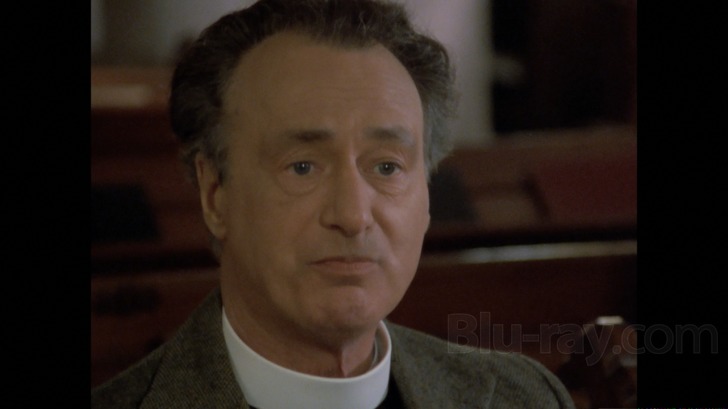
Agatha Christie mysteries are the rare outing in this genre that repay repeated viewings, even after you already know who the culprit is. That's due to the author's mastery not just of plot but perhaps even more importantly of character. Christie's keen observational style permeates these Hickson Miss Marple episodes and makes them unusually satisfying. While these don't have the whiz-bang production values of the newer Marple episodes with McEwan and McKenzie, they have something much more important: Joan Hickson as Miss Marple and a respect for Christie's original creations. Technical merits are very strong and the sole supplement is also great. Highly recommended.
Other editions
Miss Marple: Other Seasons

Miss Marple: Volume 2
They Do It With Mirrors / A Pocketful of Rye / 4.50 From Paddington / The Mirror Crack'd From Side to Side
1985-1992

Miss Marple: Volume 3
A Caribbean Mystery / At Bertram's Hotel / Nemesis / Sleeping Murder
1987-1989
Similar titles
Similar titles you might also like

Poirot: Murder on the Orient Express
2010

Stage Fright
Warner Archive Collection
1950

Twisted
2004

Waiting for Forever
2011

Downton Abbey: The Motion Picture 4K
2019

The Paperboy
2012

The Man in the Gray Flannel Suit
1956

Atlas Shrugged: Part II - The Strike
2012

Lonely Hearts
2006

The Deep End of the Ocean
1999

The United States of Leland
2003

A Stranger Among Us
1992

The End of the Affair
1999

Rookie Blue: The Complete Second Season
2010

Under Suspicion
1991

Water for Elephants
2011

A Bill of Divorcement
1932

Great Expectations
2011

Adore
Perfect Mothers
2013

The Children's Hour
1961
